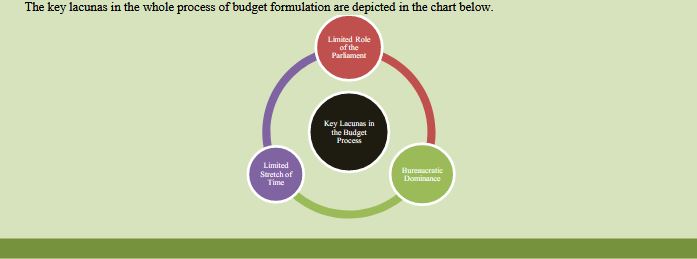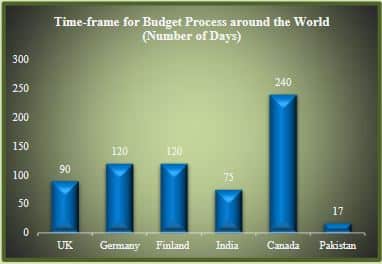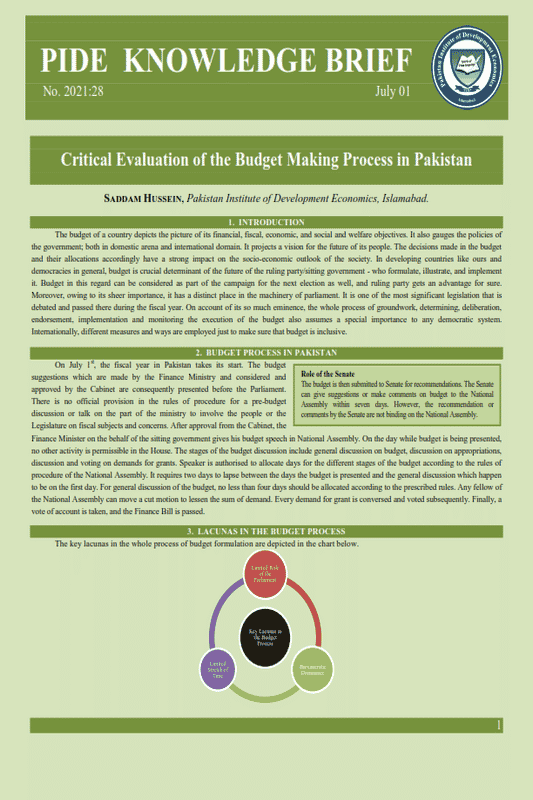
Pakistan Institute of Development Economics
- Home
Our Portals
MenuMenuMenuMenuMenuMenuMenu - ResearchMenuMenuMenuMenuMenuMenuMenu
- Discourse
- The PDR
- Our Researchers
- Academics
- Degree Verification
- Thesis Portal
- Our Portals
Critical Evaluation of the Budget Making Process in Pakistan
Critical Evaluation of the Budget Making Process in Pakistan
Saddam Hussein, Pakistan Institute of Development Economics, Islamabad.
1. INTRODUCTION
The budget of a country depicts the picture of its financial, fiscal, economic, and social and welfare objectives. It also gauges the policies of the government; both in domestic arena and international domain. It projects a vision for the future of its people. The decisions made in the budget and their allocations accordingly have a strong impact on the socio-economic outlook of the society. In developing countries like ours and democracies in general, budget is crucial determinant of the future of the ruling party/sitting government – who formulate, illustrate, and implement it. Budget in this regard can be considered as part of the campaign for the next election as well, and ruling party gets an advantage for sure. Moreover, owing to its sheer importance, it has a distinct place in the machinery of parliament. It is one of the most significant legislation that is debated and passed there during the fiscal year. On account of its so much eminence, the whole process of groundwork, determining, deliberation, endorsement, implementation and monitoring the execution of the budget also assumes a special importance to any democratic system. Internationally, different measures and ways are employed just to make sure that budget is inclusive.
2. BUDGET PROCESS IN PAKISTAN
On July 1st, the fiscal year in Pakistan takes its start. The budget suggestions which are made by the Finance Ministry and considered and approved by the Cabinet are consequently presented before the Parliament. There is no official provision in the rules of procedure for a pre-budget discussion or talk on the part of the ministry to involve the people or the Legislature on fiscal subjects and concerns. After approval from the Cabinet, the Finance Minister on the behalf of the sitting government gives his budget speech in National Assembly. On the day while budget is being presented, no other activity is permissible in the House. The stages of the budget discussion include general discussion on budget, discussion on appropriations, discussion and voting on demands for grants. Speaker is authorised to allocate days for the different stages of the budget according to the rules of procedure of the National Assembly. It requires two days to lapse between the days the budget is presented and the general discussion which happen to be on the first day. For general discussion of the budget, no less than four days should be allocated according to the prescribed rules. Any fellow of the National Assembly can move a cut motion to lessen the sum of demand. Every demand for grant is conversed and voted subsequently. Finally, a vote of account is taken, and the Finance Bill is passed.
| Role of the Senate The budget is then submitted to Senate for recommendations. The Senate can give suggestions or make comments on budget to the National Assembly within seven days. However, the recommendation or comments by the Senate are not binding on the National Assembly. |
3. LACUNAS IN THE BUDGET PROCESS

3.1. Limited Role of the Parliament
Pakistan legislative experience indicates that the there is a restricted role of the Parliament in the whole process of budget. The deliberation held on national budgets is habitually concluded just within few days. Some serious deficiencies are there in the whole machinery of budget from formulation till implementation. It doesn’t give a good picture from the perspective of good governance too. It lacks active participation from the side of parliamentarians and parliament as a whole; there is no involvement of committees at any phase. The process as it is now, seems more to be a ritualistic one. It is by no means technical or policy reflective or has no significant input from the legislature. Individual lawmakers or legislative body as a whole has almost no research and analysis support from any kind of research department. In some countries, pre-budget discussions offer an opportunity for civil society members to provide their input into the budget cycle. No such exercise is commenced in Pakistan formally.
| International Examples In Canada and India, parliamentary committees play a significant role in the budget making process, where committee assessments provide a chance to the parliament for detail scrutiny, the government’s budget proposals and their likely impact on future financial management. |
3.2. Bureaucratic Dominance
In Pakistan, the budget formulation process primarily remains an exclusive dominion of the shrewd bureaucracy, which of course is not the elective representation of the people. True representatives which are elected through the power of vote are systematically kept out of the loop regarding budget making. It is very obvious that technicalities of the budgets and numbers game has to be done by the bureaucrats and everybody agrees upon this, but the broad policy choices and course of the budget need to reflect the policy of an elected government. This is the point where extensive participation of the elected representatives is vital to make the budget inclusive process and not the entitlement of the few. Among the elected executives, it is only the Finance Minister and Minister of State in some cases who are somewhat involved in budget making. Even the cabinet which has to take the collective responsibility of all the government decisions is made to bless the budget as decorum just few hours before the budget is formally presented in the parliament. The present parliamentary budget process which hardly runs for around two weeks offer very little time for the elected representatives to either shape or meritoriously review the budget. The parliament and more precisely the National Assembly is used by the bureaucracy as a rubber stamp on this significant job of legislature. Thus, the current process does not provide any opportunity for the parliamentarians for their meaningful inputs. There is a solemn need for lawmakers to take part in budget making process at its various stages. As representatives of the people, legislators should set their priorities reflecting in the budget as per wishes of their voters.
3.3. Limited Stretch of Time
The annual budget statement is generally presented in the National Assembly during the second week of June every year and is passed in the beginning of the last week of June, which leaves around 12 to 17 working days for the various stages of budget debate in the National Assembly. For instance, this year’s Budget 2021-22 was presented on June 11, 2021. Then there was a gap of two days to start the debate on budget and on June 29, 2021, budget was finally approved. So, there was 16 days in total from presentation of the budget and its approval, without considering off days and parliament in session days. Why such a haste? The budget debate is an exercise to make parliament answerable for something it knows nothing of and has had no role in formulation or reviewing. Parliamentarians are provided roughly like 1500 to 2000 pages of finely typed printed papers bunged with figures which are hard to decode even by experts on the day the budget is presented. They have no institutional or individual backing to get briefed on the budget and they get just 02-03 days to start debating the issue. This does not let even the parliamentary parties enough time to study the budget, establish their corresponding positions and brief individual members on the considerations of the deliberation. The result is that budget speeches cover nearly anything and everything under the sun but hardly any logical or thoughtful appraisal of the budget. Most of the speeches relate to the respective electorate problems and subjects, but rarely analyse the budget. The entire budget debate continues for an average 12 days which averages around 34 hours. At no point, any part of the budget is referred to a committee for detailed review and the entire exercise is carried out in the plenary sessions of a house of 342 where no meaningful analysis or dialogue can take place. In comparison to the parliamentary budget process of Pakistan, Indian Parliament follows a parliamentary budget process of 75 days’ spell. Shortly after the general debate, the Demands for Grants for every single ministry are referred to their corresponding standing committees called Departmentally Related Committees. It is in these committees that the budget goes through a thoughtful, in-depth, and mostly non-partisan analysis. Each Committee makes a comprehensive report on its appraisal of the Demands for Grants which is then presented to the plenary which ultimately passes the budget at the close of 75-days cycle. Thus, keeping in view, the importance of the budget process, it is proposed that as a first step, the duration of the parliamentary budget process in Pakistan should be extended to minimum 60 days starting from May 01 and concluding on June 30. The budget should be presented on first working day of May each year. Likewise, mirror reforms are inevitable in the provinces as well. The current rules of the provincial assemblies also do not permit finance bill to be referred to the standing committees. The Rules of Procedure or the conduct of business in the provincial assemblies ought to be revised to offer a role for the standing committees to evaluate ministerial demands for grants once the budget is presented and formulate reports by identified period and table those reports in the House. The debate on budget should resume in the light of reports by standing committees. At present, the rules of procedures in the National Assembly do not halt committees from holding pre-budget hearings linking to their Ministries/Divisions but a more pro-active role by the committees and a backing infrastructure were required.

| The Idea of Participatory Budgeting Participatory budgeting (PB) is a different way to manage public money, and to engage people in government. It is a democratic process in which community members directly decide how to spend part of a public budget. It enables taxpayers to work with government to make the budget decisions that affect their lives. Basically, voters elect politicians to improve their communities, not just to do mere legislation without involving private sector of public in general. If elected legislators and government authorities share the responsibility of budgeting with the public, then they can better address local demands. PB helps in efficient decision making increasing the overall social welfare. Participatory budgeting is established in most of the developed countries and some developing countries have also adopted the model to consolidate democratic processes[1] Roots of Participatory Budgeting Participatory Budgeting emerged in Brazil as part of a larger effort to overturn Brazil’s long history of patronage politics, social inequity, and corruption. Government, civil society, and political parties mobilised to experiment with participatory budgeting as a way to improve government transparency and increase citizen voice in government decisions. Participatory budgeting began in 1989 in the municipality of Porto Alegre when the Workers’ Party won the mayoral elections. The new government experimented with different mechanisms to overcome fiscal constraints, re-direct capital investments and services to the poor, and provide citizens with a direct role in decision-making. Participatory Budgeting emerged from this two-year experimental process. Since then, PB has spread throughout Brazil and nearly 140 municipalities and five states have implemented some sort of a PB program. Today, over 27 countries are implementing some kind of PB program. Advantages of Participatory Budgeting · Consolidates democracy · Ensures transparency and accountability · Informed Decision making · Fair Spending |
CONCLUSION
In conclusion, few policy recommendations are being proposed from the above analysis, which would help improve the system or at least start a healthy discussion about the subject. Firstly, in order to link the break between people and the Parliament, each standing committee should hold 03 to 05 days’ public hearings on ideas, views, and proposals about the next budget from the stakeholders relating to the area of concern/expertise of each committee. The hearings should be publicised in the media and media be allowed to cover the hearings. This act alone will be the single most rewarding activity for the Parliament and parliamentarians. Each hearing should be well-documented.
Secondly, the standing committee on finance may undertake a comprehensive exercise of holding pre-budget public discussions in several cities of the country. The exercise may instigate with the advertisements in national newspapers by the Finance Committees inviting public and various interest groups and stakeholders such as Chambers of Commerce, Civil Society Organisations (CSOs), and Trade Unions to propose their thoughts and recommendations for the next budget in script. The committee then may travel to numerous cities of the country where it may hold open forums with the people and all major stakeholders about the next coming budget. The Finance Committee should invite various experts to present their viewpoints. Grounded on this exercise, the committee may pile up its report and endorsements and advance these to the Ministry of Finance for possible incorporations in the budget. This exercise may not only strengthen the position of the parliament as the supreme body that would articulate public views and concerns on subjects of public and national concern, but it will also make available very useful insight into public issues and would make the budget making process an inclusive one. The committee may act as a very effective link between the people and the executive.
Thirdly, many developing countries have established an agency of the Parliamentary Budget Office, a sovereign office that looks at the budget and national economy from the perspective which is dissimilar from that of the executives and provides this information to the Parliamentarians. Pakistan’s parliament can also devise such an office to offer technical support to the parliamentarians with respect to budget formulation and related dynamics.
Fourthly, a number of parliaments across the globe have their Autonomous Budget Offices; Philippines established its Congressional Budget Office in 1990, Mexico in 1998, Uganda in 2001, Canada in 2006 and lately Afghanistan in 2007. Such an office provides an independent non-partisan enquiry of the budget to the parliamentarians who can greatly help them in reviewing the budget and developing an opinion on it. In keeping with the increasing trend in the world, Pakistani Parliament should initiate the establishment of an Independent Budget Unit within the Parliament as a starter, having experts who can provide impartial information as well as analysis relating to the budget for the understanding of the parliamentarians. A feasibility study be commissioned and a comparison of various Independent Parliamentary Budget Units existing in the world may also be considered. Afterwards, it may also evolve into Autonomous Budget Unit, functioning as an exclusive body, formulating budget proposals from a technical and academic perspective, which then would be reviewed by the Parliament for approval – keeping in view the political priorities and national consensus.
Lastly, reform of the budget process must also create space to involve civil society stakeholders. As entities organised around shared interests, purposes, and values, they can be an important countervailing power to the state. Think tanks, policy institutions, Non-Governmental Organisations (NGOs), professional associations, communities, activists, support groups, volunteers, social enterprises, trade unions, cooperatives and academia can help set intra-sectorial and inter-sectorial priorities and strengthen analytical ability.
REFERENCES
The write up is based on interviews with economists, experts and officials from the parliaments, along with analysing the existing literature.
Ahmed, D., & Asif, A. (2007). A Guide to Understanding the Budget in Pakistan. Pakistan Institute for Parliamentary Services (PIPS), Islamabad. https://pips.gov.pk/guide-understanding-budget-pakistan-english-june-2007
Nishthar, S. (2010). The Budget Process. The News International. http://www.heartfile.org/pdf/ 89_budget_process.pdf
Pakistan Institute of Legislative Development and Transparency. Involvement of Civil Society and Media in the Budget Process: The Canadian Experience. Case Studies from Canada. PILDAT. http://www.pildat.org/ Publications/publication/Budget_ Eco_Finance/InvolvementofCivilSocietyandMediainBudgetProcessinCanada.pdf
Pakistan Institute of Legislative Development and Transparency. Effective Budget Process in Pakistan, PILDAT. http://www.pildat.org/publications/publication/Budget_Eco_Finance/EffectiveBudgetProcessinPakistan.pdf
Network of Parliamentary Budget Officials and Independent Fiscal Institutions (2010). OECD. http://www.oecd.org/gov/ budgeting/oecdnetworkofparliamentarybudgetofficialspbo.htm
Shah, A. (2007) Participatory Budgeting: Public Sector Governance and Accountability Series. https://www.unicef.org/ spanish/socialpolicy/files/Participatory_Budgetting_Shah07.pdf
Hope for Democracy: 25 Years of Participatory Budgeting Worldwide, Nelson Dias. https://www.buergerhaushalt. org/sites/default/ files/downloads/Studie_Hope_for_democracy_-_25_years_of_participatory_budgeting_worldwide.pdf



